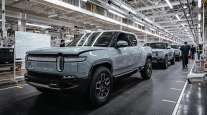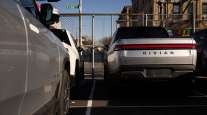The Detroit News
Rivian Plans EV Charging Network

[Stay on top of transportation news: Get TTNews in your inbox.]
Electric vehicle maker Rivian Automotive is borrowing a page from Tesla Inc. and building an exclusive, fast-charger network for its coming R1T pickup and R1S SUV.
Dubbed the Rivian Adventure Network, it promises an ambitious, 600 super-charging stations offering 3,500 chargers by 2023 on routes across the United States and Canada. The chargers will be exclusive to Rivian owners, though a secondary, so-called Waypoint network of 10,000, 240-volt chargers will be open to the public at hotels and other businesses.
With big capital reserves, Rivian and Tesla are separating themselves from the electric vehicle pack by building exclusive charging networks. Other legacy automakers (as well as less capitalized EV startups such as Lucid and Fisker Inc.) intend to rely on third-party, fast-charging networks including Electrify America, Chargepoint and EVGO.

Even before the pandemic, DHL's Larry S. Onge and Jim Monkmeyer set up strategies and implemented technology in order to respond to disruptions. Now, they know exactly how to get the vaccine from point A to point B — and, better, how to do it at a global scale. Hear a snippet, above, and get the full program by going to RoadSigns.TTNews.com.
Each Rivian charging station will operate six chargers on average at speeds starting at 200 kW (with planned 300 kW). Tesla’s 150-250 kW fast-charging stations — “Super Chargers” in Tesla speak — average nine stalls per station, with the largest housing 56 stalls south of San Francisco.
Tesla’s Supercharger network launched in 2012 with its Model S sedan and has grown to 1,101 stations across North America. It has added enormous overhead cost to the young electric automaker — but has also been a key factor in establishing its EV dominance as Teslas can reliably slake their thirst for electrons on long-distance trips.
Competitors such as the Chevy Bolt, GMC Hummer EV, Ford Mustang Mach-E, and Volkswagen ID.4, by contrast, cannot use Tesla or Rivian fast chargers. They must rely on the patchwork of third-party chargers.
Legacy automakers hope Electric America’s fast-growing network of 500 stations (built by VW as penance for the Dieselgate scandal) — as well as anticipated spending from electric utilities and the Biden administration’s forthcoming, $3 trillion infrastructure bill — will help them compete.
“(Our) nationwide network of DC fast chargers are capable of adding up to 140 miles of range in 20 minutes to the R1T and R1S,” said Rivian in announcing its network on its website.
“The Rivian Adventure Network is designed for quick recharges so you can keep moving. Los Angeles to Tahoe. Manhattan to the Adirondacks. I-70 to the Rockies. Michigan’s UP via I-75. The entire Blue Ridge Parkway from Shenandoah National Park down to Great Smoky Mountains National Park. The network also extends further into more remote destinations.”
The remote destination promise dovetails with Rivian’s marketing as an adventure brand bringing battery power to off-road vehicles. The brand is aimed at well-heeled overlanders who want to get away to national parks and other locations.
Rivian promises its Waypoint 240-volt, “Level Two” chargers in every state park. It jump-started that goal this week by committing to install at least two charging stations in all 42 Colorado state parks by July.
The EV maker is also committed to producing 10,000 battery-powered delivery trucks for Amazon by 2022 (100,000 by 2023) — but the Rivian Adventure Network will operate separately from infrastructure charging those trucks.
Rivian says its charging network will be conveniently located on highways and roads near cafes and shops. Tesla Superchargers are commonly found at Meijer mega-stores with dining and shopping nearby to kill time while its vehicles charge up to an hour depending on the amount of range required. Electrify America stations are frequently found at Walmarts. A Toledo area EA station is located at an Ohio turnpike service plaza.
Rivian says that details on pricing will be released for customers soon. Third-party charging companies typically have subscription plans with some automakers covering their costs for first-time EV buyers. Tesla rolled out its service free to Model S owners in 2012 but has since begun charging as more vehicles like the hot-selling Model 3 sedan have come to market.
The EV maker with operations in Plymouth, Mich., and California offers a wall charger for home installation at vehicle purchase. EV makers recommend 240-volt charger installations for about 16 miles of charge per hour. A standard, 120-volt outlet returns a meek few miles of charge per hour.
Want more news? Listen to today's daily briefing below or go here for more info:
Distributed by Tribune Content Agency, LLC




